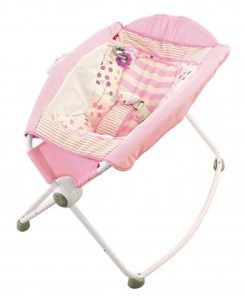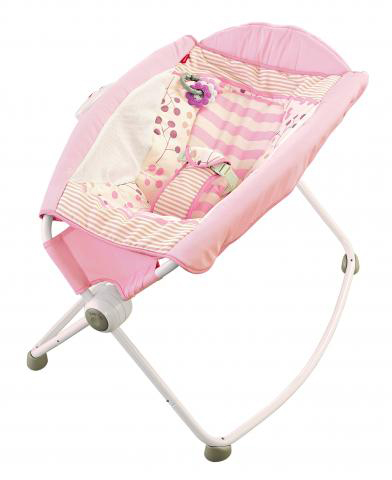Posts Tagged ‘Fisher-Price Rock ‘n Play’
Infant Sleeper Recalls Continue Nearly a Year After Fisher-Price

Nearly a year after the Fisher-Price Rock ‘n Play recall, the work continues to remove unsafe sleepers from the market.
After more than 70 infant deaths involving inclined sleepers, the Consumer Product Safety Commission (CPSC) and lawmakers continue working to prevent injuries.
The CPSC recently announced the recalls of over 165,000 infant sleepers from four companies: Summer Infant, Evenflo, Delta Enterprise Corp. and Graco. Thankfully, these recalls are not related to any deaths or injuries. They are part of the CPSC’s ongoing work to protect children after Fisher-Price’s startling revelations about its Rock ‘n Play, which has been linked to dozens of infant deaths. However, these models have not been linked to injuries, according to the CPSC and at least one company initially refused the CPSC’s efforts.
Graco is recalling the largest number of units, 111,000 Graco Little Lounger Rocking Seats. Sumr Brands is recalling 43,000 SwaddleMe By Your Bed Sleepers. Delta Inclined Sleepers is recalling about 5,900 units and Evenflo has about 3,100 units involved in the recall.
If you own one of these sleepers, you can read the recall notices on the CPSC website. You should be able to contact the manufacturer and return your sleeper for a cash refund or a voucher.
Consumers are urged to stop using the inclined infant sleepers. It is better to return the infant sleepers, rather than discard them in the trash.
Fisher-Price Rock ‘n Play
Parents received the first frightening warning about inclined infant sleepers last April, when Fisher-Price issued an advisory for parents, initially announcing 10 babies had died in the sleeper after turning from their back to their stomach, then suffocating. The company warned parents not to let children use the sleeper after 3 months old.
Within days, facing outrage from parents and new allegations, Fisher-Price acknowledged more deaths and had to replace its advisory with a recall notice for 4.7 million Rock n’ Play sleepers. Because this product was sold for 10 years, this has been a massive recall. Adding to the challenge is so many companies have followed Fisher-Price’s lead and developed similar inclined sleep products.
After Fisher-Price, we learned that Kids II was also facing allegations that several infants had died in its sleepers. The company recalled 700,000 products in late April, just a few weeks after Fisher-Price took action.
Federal Legislation to Ban Inclined Sleepers
The CPSC has been working with other companies to identify unsafe sleepers while advising consumers not to use inclined sleep products. The Fisher-Price sleeper and other models are dangerous because they sit at a 30 degree incline. Babies can roll over and suffocate. The American Academy of Pediatrics (AAP) advises parents to put infants on flat surfaces to sleep and remove blankets, toys and other items. Researchers from the University of Arkansas have also recommended flat surfaces for sleeping and have said any incline should fall under 10 degrees.
Federal legislation has been proposed to ban inclined these sleepers altogether. According to Consumer Reports, the Safe Sleep for Babies Act has already passed in the House of Representatives. If this happens, the CPSC will not have to pursue product recalls one by one and negotiate with each manufacturer.
Boston Product Liability Lawyers – Boston Personal Injury Lawyers
Free Legal Consultation
Breakstone, White & Gluck has over 100 years combined experience representing those injured by the negligence of others in Massachusetts. Our attorneys have extensive experience in the area of product liability and defective products. For a free legal consultation, contact our firm at 800-379-1244 or 617-723-7676 or use our contact form.
After Millions of Recalls, New Safety Standard Proposed for Infant Sleepers

Fisher-Price recalled its Rock ‘n Play sleeper in April.
Last April, Fisher-Price made its jarring announcement: 10 babies had died in its sleepers after rolling from their backs to their stomachs. Fisher-Price urged parents to take children out of the sleepers once they reach 3 months old or begin turning themselves over.
This advisory didn’t stand. Soon thereafter, Consumer Reports published the results of its own investigation, which identified 32 infant deaths. Within the week, Fisher-Price and Mattel, its parent company, had recalled 4.7 million unsafe sleepers.
Now six months later, The Washington Post reports that 59 babies have died in Rock ‘n Play sleepers. At least two other companies, Kids II and Dorel Juvenile Group USA, have recalled their infant sleeper products. At the time of the recall, 5 infants had died on the Kids II sleepers.
Last week, the Consumer Product Safety Commission (CPSC) proposed a new safety standard for infant sleep products. This would limit the seat back angle for sleep to 10 degrees or less.
Why Was the Fisher-Price Rock ‘n Play So Dangerous?
Fisher-Price introduced the Rock ‘n Play in 2009, inventing the category of inclined sleepers, which allowed babies to sleep at a 30 degree angle. From the start, this design completely disregarded the American Academy of Pediatrics’ safe-sleep guidelines, which recommend babies sleep on their backs in an empty crib or bassinet to avoid accidental suffocation.
One problem was Fisher-Price didn’t do thorough safety testing or consulting with medical experts. But you can’t overlook the fact that Fisher-Price has been a giant in children’s products and how that influenced the discussion. As one pediatrician told The Washington Post, “This is not something I’d recommend using. But parents see that it’s from Fisher-Price and think, ‘They wouldn’t be able to sell anything that isn’t safe.’ ”
New Research Findings
The CPSC asked an assistant professor of orthopedic surgery who specializes in infant biomechanics to lead a study on inclined sleep products. The professor is based at the University of Arkansas for Medical Sciences. She and her team found evidence that babies age 2-6 months on average who were placed in inclined sleep products were at a higher risk of suffocation, when compared to a flat crib mattress.
- Her team concluded that none of the inclined sleep products tested were safe for infant use.
- The university team suggested the angle of the incline be no more than 10 degrees. The lying surface should be flat and rigid, not soft or plush-like.
- The team reported that babies who were placed on their stomach in their sleepers or who rolled over had to exert as much as 200 percent more core strength than those on a flat crib mattress.
- Finally, the university team reviewed police reports and interviews from 91 cases of infant suffocation. In many cases, the caretaker reported they had never seen the infant roll over before.
This was a recurring point in the team’s findings. Many of the children were rolling over for the first time when they were found.
Here is additional information for further reading:
UAMAS Research into Baby Biomecanics Shows Issues with Infant Inclined Sleepers, University of Arkansas
After Infant Deaths, Fisher-Price Rock ‘n Play Sleeper is Recalled, Massachusetts Injury Lawyer Blog
More Infant Sleep Products Linked to Deaths, Consumer Reports
Consumer Product Safety Commission: No More Inclined Sleepers, Chicago Sun Times
Free Consultation – Boston Product Liability Lawyers
With more than 100 years combined experience, Breakstone, White & Gluck specializes in plaintiff representation in product liability cases. We represent clients throughout Massachusetts, from Boston to Cambridge to Plymouth, Brockton and Cape Cod to the North Shore.
If you have been injured, learn your legal rights. For a free legal consultation, contact our firm at 800-379-1244 or 617-723-7676. You can also use our contact form.
After Infant Deaths, Fisher-Price Rock ‘n Play Sleeper is Recalled

Fisher-Price has recalled its Rock ‘n Play sleeper after an investigation found more than 30 infants died while using it.
It once looked the perfect place to nap and cuddle. But this adorable product – the Fisher-Price Rock ‘n Play Sleeper – wasn’t ever safe. Fisher-Price and the Consumer Product Safety Commission (CPSC) announced the recall of 4.7 million sleepers on April 12, 2019. Parents are being urged disassemble the sleeper and stop using it. The company expects to spend the next several months processing recalls.
Prior to the company’s action, the American Academy of Pediatrics (AAP) had joined Consumer Reports in calling for the product’s removal, stating the Fisher-Price Rock ‘n Play failed to comply with its recommendations, which state infants should only sleep on flat and firm surfaces. Further, the AAP advises infants should not be left on the same surface as other bedding, toys or bumpers, which could increase the risk of infant suffocation or choking.
Fisher-Price, a division of Mattel, is asking parents to contact the company for a refund or voucher toward another Fisher-Price product. The company will offer a full refund for Rock ‘n Play sleepers purchased during the past six months.
Resources:
Fisher-Price Rock ‘n Play Recall Notice, Consumer Product Safety Commission
Mattel and Fisher-Price Recall Page for Parents
The Week of Bad Headlines for Fisher-Price
Fisher-Price and the CPSC announced the product’s recall on Friday, April 12th, following days of pressure from safety organizations. Fisher-Price had initially resisted.
On April 5, the CPSC and Fisher-Price released an initial warning and announced 10 infants had died in the Rock ‘n Play between 2015 and 2019. The infants were all 3 months or older and died after rolling over from their back to their stomach or side.
At that point, there was no recall, but parents were advised to stop placing children in the sleeper once they reach 3 months old, or earlier if they begin turning themselves over.
Days later, Consumer Reports came out with a troubling report linking the product to not 10, but 32 infant deaths since the 2009 release. The consumer watchdog called on the CPSC to immediately issue a recall of the defective product. In response, Fisher-Price said the company did not believe any of these deaths were caused by the sleeper. Rather, the company said medical and health conditions were cited as the cause in some deaths, and in other cases involved improper use of the sleeper.
Shortly after, Americans heard from the AAP: “This product is deadly and should be recalled immediately.”
Despite the AAP recommendations, Fisher-Price managed to introduce the Rock n’ Play and sold it for a decade. Before the recall, it was selling for $40 to $149 at various retailers. The product sits elevated in a canopy-like environment for sleeping and sitting and featuring a “motorized rocking motion” and musical tunes. The problem is when a baby’s head falls forward or sideways. This can block the child’s access to oxygen.
Parents should do careful research when buying children’s products. Monitor the CPSC website for warnings and recalls, as well as the Consumer Reports website. We can expect to hear more about the dangers of other sleeper products in the near future, as Consumer Reports continues its investigation. On April 11, it reported on four other child deaths linked to Kids II sleepers.
More Reading:
Fisher-Price Rock ‘n Play Sleeper Should Be Recalled Immediately, Consumer Reports
Fisher-Price Rock ‘n Play Recall, New York Times
Buying Safe Toys, Breakstone, White & Gluck Project KidSafe
Contact the CPSC About Dangerous Products and Injuries
If you are ever injured while using a consumer product, you should contact the CPSC to report the injury. The CPSC is the federal agency responsible for overseeing the recall process, releasing warnings to the public and collecting injury data. The CPSC works with manufacturers to issue product recalls.
Free Legal Consultation – Contact a Boston Product Liability Lawyer
If you have been injured, it is also in your best interests to consult a Boston product liability attorney. At Breakstone, White & Gluck, our Boston attorneys have represented clients injured by defective products, medical devices and vehicles. Prompt investigation is necessary in product liability cases and our attorneys are known for our thorough, detailed and capable investigation.
For a free legal consultation, contact our lawyers today at 800-379-1244 or 617-723-7676 or use our contact form.

